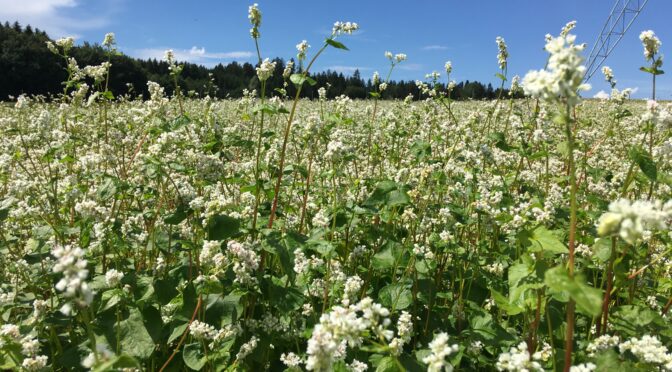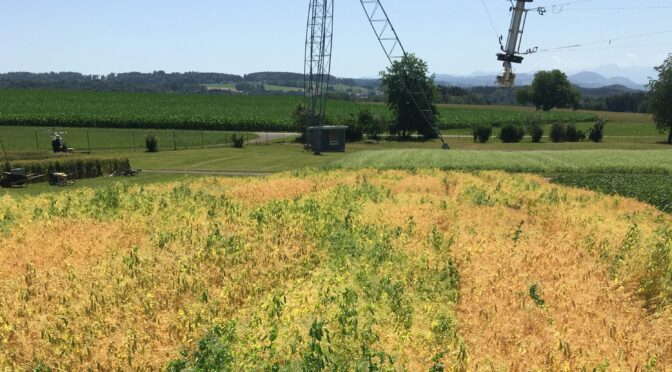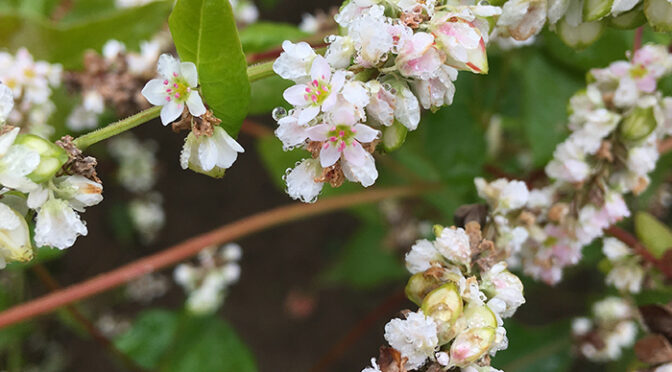
Grégoire Saboret1, Loïc Thurre2, Noémie Pidoux 3(2024). Food for Thought: Could Swiss agriculture provide healthy and sustainable food for its population? (PDF)
The Planetary Health Diet (PHD) is a reference diet for the entire population aimed at respecting the planetary boundaries for environmental resources while optimizing human’s population health (Willet et al. 2019). Swiss consumption of certain types of food is far from the PHD. This suggests that dietary habits should shift protein sources towards plant-based options, preferably non-transformed such as beans, lentils or soy. This change can’t be triggered without considering a transformation of our agricultural systems. Currently, one-third of Switzerland’s land is dedicated to agriculture, covering about 1.5 million cultivated hectares, or roughly one hectare per five to six inhabitants. We posed a simple question: Could Swiss agriculture theoretically produce the PHD on this area?
Continue reading Could Swiss agriculture produce Planetary Health Diet? →

In this report, we summarize the efforts to reduce GHG emissions in the community catering of three Swiss universities: University of Zurich, Eidgenössische Technische Hochschule Zurich and University of Basel. We present possible interventions and policies implemented in the canteens and discuss the impacts of these interventions in the institutional environments. Finally, we arrive at some recommendations for further action.
García Rosa, A.V., Scharte, M., Paschke, M. (2023). Improving sustainability through canteen policies and interventions at three Swiss universities: ETH Zurich, University of Zurich and University of Basel. Download the report (PDF)
Continue reading Improving sustainability through canteen policies and interventions at three Swiss universities →

Response Doctoral Program
Die ETH Zürich und ProSpecieRara laden Buchweizen-Produzent:innen und -Interessierte herzlich zu einer Fachtagung am Freitag, den 25.8.2023 in Lindau (Zürich) ein.
Continue reading Stakeholder Dialog – Fachtag Buchweizen →

By Beat Keller, Crop Science at ETH Zurich
The Swiss agriculture is traditionally focused on meat and dairy production. Yet, global warming requires agricultural practices to radically change: without decreasing livestock production, there is no sustainable solution for food production (about 85% of the Swiss agricultural emissions originate from livestock production). Fortunately, the Swiss population is consuming more and more plant-based proteins substituting animal products.
There is increasing demand for legume species such as soybean, faba bean and peas. However, adapted legume varieties for human consumption, local production and supply lines are largely missing. Only soybean has established supply chains and modern varieties thanks to the foreseeing breeding program of Agroscope which started decades ago.
Continue reading Plant-based proteins: The potential for Swiss agriculture →

Response Doctoral Program
Pseudocereals such as buckwheat (Fagopyrum esculentum Moench) are under-utilized as sources for plant-based proteins in current times, where the world is searching for a diversification of agricultural cropping systems. Buckwheat was an important crop in recent times in Western Europe including Switzerland and has several qualities:
- It is a valuable source of proteins for human nutrition. Buckwheat contains all nine essential amino acids which makes it a high-quality, complete protein. It is rich in limiting amino acids like lysine and arginine, which are in shortest supply in plant-based diets.
- It became popular in satisfying the increasing demand for gluten-free foods.
- It has a unique taste – in contrast to rice or wheat.
- So far, it is little affected by pests and diseases in the field that could reduce its yield.
- As a cover crop, it contributes to soil protection and soil improvement as part of a crop rotation.
- It is good for pollinators and a rich source of nectar while contributing to a biologically diverse agriculture.
Despite all these positive qualities, buckwheat cultivation suffers from low and unstable yields, and in comparison to wheat, the baking quality is inferior. Potentially, this bottleneck can be overcome with breeding. Here, the screening of genetic resources could unlock undiscovered potential and the cultivation of buckwheat on Swiss farms may experience a renaissance!
Continue reading Unlock valuable protein sources in the pseudocereal buckwheat →

Response Doctoral Program
Pseudocereals such as buckwheat (Fagopyrum esculentum Moench) are under-utilized as sources for plant-based proteins in current times, where the world is searching for a diversification of agricultural cropping systems. Buckwheat was an important crop in recent times in Western Europe including Switzerland and has several qualities:
- It is a valuable source of proteins for human nutrition. Buckwheat contains all nine essential amino acids which makes it a high-quality, complete protein. It is rich in limiting amino acids like lysine and arginine, which are in shortest supply in plant-based diets.
- It became popular in satisfying the increasing demand for gluten-free foods.
- It has a unique taste – in contrast to rice or wheat – and can be made into deliciously tart pancakes or pasta.
- So far, it is little affected by pests and diseases in the field that could reduce its yield.
- As a cover crop, it contributes to soil protection and soil improvement as part of a crop rotation.
- It is good for pollinators and a rich source of nectar while contributing to a biologically diverse agriculture.
Despite all these positive qualities, buckwheat cultivation suffers from low and unstable yields, and in comparison to wheat, the baking quality is inferior. Potentially, this bottleneck can be overcome with breeding. Here, the screening of genetic resources could unlock undiscovered potential and the cultivation of buckwheat on Swiss farms may experience a renaissance!
Continue reading Unlock valuable protein sources in the pseudocereal buckwheat →
Engaging in a Science and Policy Dialogue





